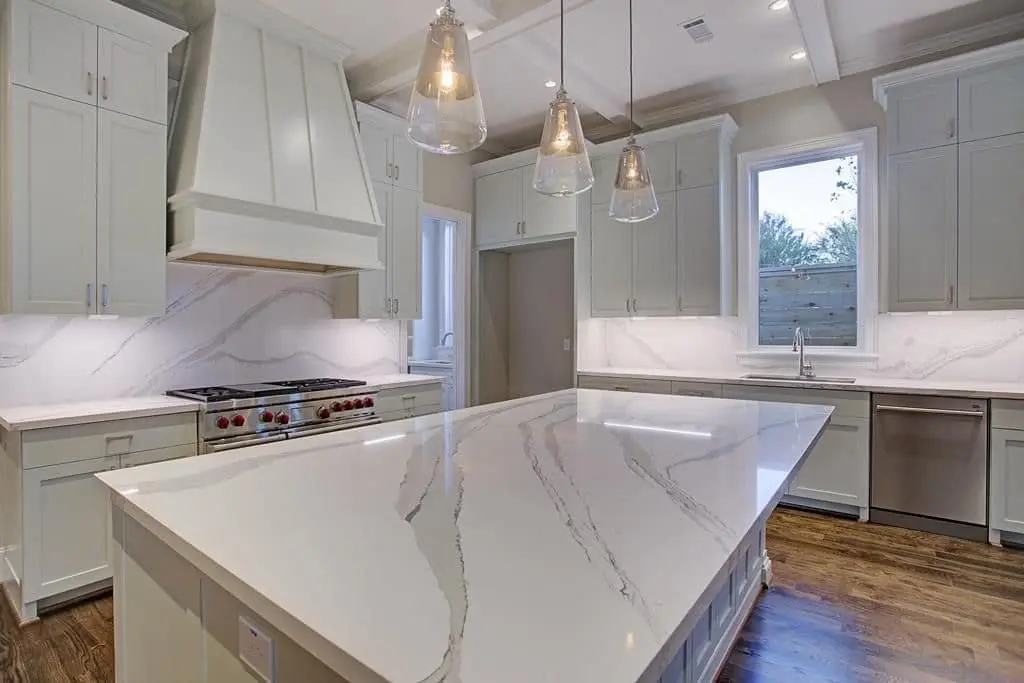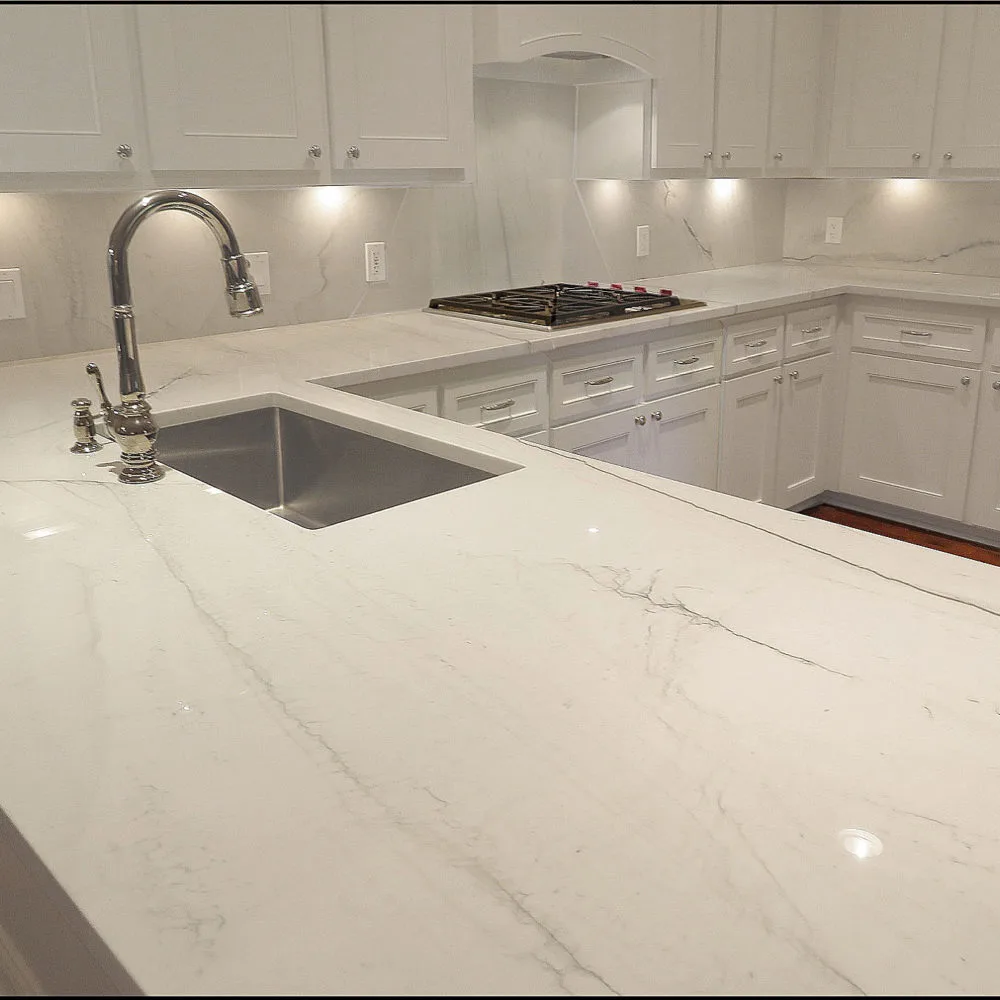Quartz countertops are one of the most popular choices in modern kitchens and bathrooms due to their luxurious appearance, impressive durability, and low maintenance. Whether you have just installed quartz countertops or you’re looking to extend the life of your current ones, proper cleaning is essential.
In this article, we’ll explore how to clean quartz countertops effectively, while also touching on maintenance tips, cleaning mistakes to avoid, and how quartz compares to other surfaces like granite and marble.

Understanding Quartz Countertops
Before diving into the cleaning methods, it’s crucial to understand what quartz countertops are made of. Unlike natural stone, quartz countertops are engineered surfaces composed of approximately 90–95% ground quartz and 5–10% polymer resins and pigments. This makes them non-porous, stain-resistant, and easier to maintain than other stone options like granite or what is a marble slab?.

Daily Cleaning Routine
1. Use a Soft Cloth and Mild Soap
To clean quartz countertops daily:
- Wipe the surface with a soft microfiber cloth.
- Use warm water mixed with a few drops of mild dish soap.
- Gently scrub the countertop in circular motions.
- Rinse with clean water and dry with a soft towel to avoid streaks.
This gentle method helps remove dust, crumbs, and light spills without damaging the surface or dulling the finish.
How to Clean Tough Stains on Quartz Countertops
1. Use a Non-Abrasive Cleaner
For tough stains like dried food or grease:
- Apply a non-abrasive surface cleaner such as Simple Green or 409.
- Let it sit for 5–10 minutes.
- Use a plastic scraper or soft sponge to gently lift the residue.
- Rinse thoroughly with warm water and dry.
2. Isopropyl Alcohol
For more stubborn stains like ink or food coloring:
- Dampen a cloth with 70% isopropyl alcohol.
- Gently rub the stained area.
- Rinse and dry with a microfiber cloth.
Avoid using bleach or any cleaner with a pH above 10, as it can damage the resin in quartz countertops.
What Not to Use on Quartz Countertops
Avoid these common mistakes:
- No abrasive scrubbers: Steel wool or rough sponges can scratch the surface.
- No harsh chemicals: Avoid oven cleaners, paint removers, or bleach.
- No acidic cleaners: Products containing vinegar, lemon juice, or ammonia can dull the finish.
- No direct heat: Always use trivets for hot pots and pans to avoid thermal shock.
Preventive Maintenance Tips
1. Wipe Spills Immediately
Although quartz is stain-resistant, it’s not stain-proof. Clean up wine, coffee, and oil spills as soon as possible to prevent permanent marks.
2. Use Cutting Boards
Don’t cut directly on the quartz surface. Use cutting boards to protect both your countertop and your knives.
3. Protect from Direct Sunlight
Extended UV exposure can cause discoloration. If your quartz countertop is in a sunlit area or used outdoors, consider applying UV-resistant films on windows.
Deep Cleaning Routine (Weekly or Bi-Weekly)
- Use a pH-balanced quartz cleaner.
- Spray the surface evenly and let it sit for a few minutes.
- Wipe down with a soft cloth.
- Pay attention to high-touch areas like around sinks, stoves, and food prep zones.
Comparing Quartz Countertops to Other Materials
Quartz vs Granite
- Quartz countertops vs granite: Quartz is non-porous and requires no sealing, whereas granite needs annual maintenance. Quartz also offers more color consistency.
Quartz vs Marble
- Quartz countertops vs marble: Marble is softer and more prone to scratches and etching, while quartz is more durable and easier to clean.
For example, How to Use a Marble Slab as a Food Prep Surface? requires more caution than using quartz.
Quartz Countertops in Different Settings
Kitchen Use
Quartz is ideal for kitchens because of its resistance to stains, ease of cleaning, and hygienic surface. Popular in kitchen islands, quartz delivers both beauty and practicality.
Bathrooms
Because it resists moisture, quartz is a favorite for vanity tops and walls in modern bathrooms.
Outdoor Use
Although not typically designed for outdoor use, quartz countertops outdoor applications are growing in popularity. Just ensure proper shading to avoid UV damage.
Common Quartz Countertop Questions
How Much Do Quartz Countertops Cost?
The quartz countertops cost can range from $50 to $120 per square foot installed. Factors include the brand, color, and thickness.
What Thickness Is Ideal?
Most residential applications use quartz countertops thickness of 2cm or 3cm, with 3cm being more common for high-end aesthetics.
Where to Find Quartz Countertops?
Searching for “quartz countertops near me” can yield local suppliers. Be sure to read reviews and visit showrooms when possible.
Design Ideas for Quartz Countertops
- Quartz countertops colors: Popular choices include white, gray, and marble-look quartz.
- Quartz countertops backsplash ideas: Matching full-height backsplashes are trending.
- Best quartz countertops brands: Caesarstone, Cambria, and Silestone top the list for quality and innovation.
Final Thoughts
Knowing how to clean quartz countertops properly will help maintain their beauty and performance for decades. With minimal maintenance and exceptional durability, quartz countertops remain one of the best choices for modern kitchens and bathrooms.
Whether you’re comparing options like quartz countertops vs granite or just learning what is a marble slab?, quartz offers the perfect blend of function and luxury.

